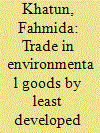| Srl | Item |
| 1 |
ID:
120078


|
|
|
|
|
| Publication |
2012.
|
| Summary/Abstract |
In the backdrop of persistent trade deficit, Bangladesh has been extensively liberalizing its trade regime since 1992 in order to achieve higher export performance and GDP growth. However, despite the liberalization, imports are still growing faster than exports, increasing trade deficit. The article empirically examines the impacts of trade liberalization on export performance in Bangladesh, using the ARDL 'Bounds Test' approach with annual time series data. Empirical results indicate that trade liberalization is having statistically significant but low impact on aggregate export. Neither capital stock as a technology transfers nor liberalization through reduction and withdrawal of export duties shows a significant impact on export performance. Exports are mostly stimulated by GDP growth. The interaction of liberalization with GDP increases exports a little, hence improving the trade balance. However, the liberalization enhances imports compared to exports hence the trade deficit. Therefore, a combined and consistent policy to promote GDP growth, technology transfers and domestic price stability, including education, infrastructures and backward linkage industries is essential in order to achieve higher export performance in Bangladesh.
|
|
|
|
|
|
|
|
|
|
|
|
|
|
|
|
| 2 |
ID:
120076


|
|
|
|
|
| Publication |
2012.
|
| Summary/Abstract |
Liberalization of environmental goods and services as laid out in the work programme of the Doha Ministerial Declaration of the World Trade Organization has implications for least developed countries as these countries are vulnerable to climate change. They need to follow and participate in the negotiation in order to achieve market access opportunities for environmental goods and services of their interests in the global market and to access cleaner technologies at an affordable price. Such participation will be meaningful if it is backed by informed arguments based on analytical exercise. This article estimates that export of environmental goods by least developed countries stood at 0.08 per cent and import at 0.82 per cent of global exports and imports of environmental goods, respectively, in 2007. The article suggests that even with low trade, least developed countries stand to gain through reduction of tariff and non-tariff barriers on environmental goods. This will, however, have to be combined with appropriate technology transfer and adequate financial support.
|
|
|
|
|
|
|
|
|
|
|
|
|
|
|
|